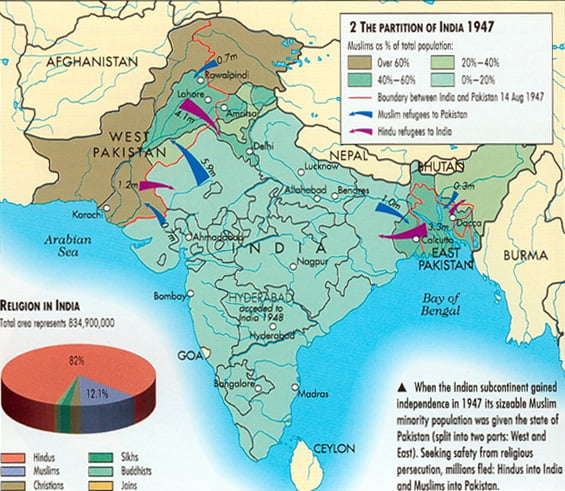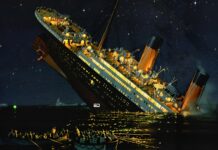QuoraED! This is when we pick up a trending or interesting thread from Quora and spin a story around it.
If you’re bored or have nothing to do, Quora is the site that will captivate you with its uniquely interesting and creative questions and even more enjoyable are the answers that follow.
What would have happened in India if it hadn’t been partitioned in 1947?
Something to think about, would India have been better off (with no Kashmiri conflict and no Indo-Pak conflicts) or worse off (with many more Hindu-Muslim conflicts and being the poorest nation with 600 million hungry)?
The following answer, written by Ravi Katragadda, Saffron-White-Green Indian, and Andhrite, is the most interesting and logical answer that I came across:
Political issues:
1. The Indian National Congress would have been the strongest party post-British Raj because it played a central role in the independence movement. This party would have won most of the elections for a couple of decades.
2. There would have been an All India Muslim League, which would have been the second-largest national party. It would have been very successful in areas like Bengal, Hyderabad, all the states of Pakistan, Kashmir, etc.
3. There is a good possibility that the BJP would have emerged at a later stage, but would have been a weaker party. It is because, with the presence of the Muslim League, both INC and BJP would have been perceived as Hindu parties.
4. Imagine all the regional parties that would have come up. There would have been one each for Sinhalese, Gorkhas, Balochis, Pashtuns, Bhutanese, Bengalis, Tamils, Telugus, etc.
5. In addition, throw in a bunch of CPI, CPIM, LTTE, Maoists insurgents, Islamic fundamentalists, etc.
READ ALSO: QuoraED: What Do Pakistani Youth Think About India?
South Asian Union – a failed state?
All this means that the very notion of democracy wouldn’t have made any sense at all. The idea of democracy is not to have a political party for every vote bank and create a dysfunctional coalition. This hypothetical country would have got caught in coalition politics and would have lost its way.
– The main reason why Indian democracy works is that regional parties are limited only to a couple of states and every state (except Tamil Nadu) has a national party in the ruling or the opposition. I don’t think this would have been the case if the SAU came into existence.
– Also, the Muslim voters in India are very evenly spread out in all constituencies, along with the length and the breadth of the country which rules out the possibility of a national party that caters to Muslims in specific (like the All India Muslim League).
This helped the Indian Muslims join the mainstream politics through Indian national congress, etc. and lead to their active participation in the Indian democracy. Now, in the hypothetical SAU this would not have been possible and on the contrary, it would have lead to a parallel religious identity.
– You should also consider that most of India’s neighbors are extremely unstable and permanently stuck in crises. Pakistan, Bangladesh, Nepal, Sri Lanka, Afghanistan, Myanmar were all politically unstable since they became independent. There is no evidence to prove that, these crises would have been averted by the creation of the SAU.

Personal opinions:
– I personally feel that an SAU excluding Pakistan would not have been very different from India today. We would have still been able to build a strong, successful liberal, democracy- but that is my personal opinion.
The Sinhalese part of Sri Lanka, Nepal, Bhutan, United Bengal would have made excellent states in the new Indian republic because all of them have a strong unique linguistic basis to be independent states in India.
– People should realize that creation of Pakistan was not a mistake. It was an idea whose time had come. The mistake, in my opinion, was the nuclearization of Pakistan. This leads to an asymmetric shift in the balance of power and increased the warmongering in the Indian subcontinent.
– The biggest threat to the hypothetical SAU would have been the emergence of a parallel religious identity; which in India’s case does not impact our democracy today. Yes, we do have parallel linguistic/caste identities, but they are somehow secondary to our primary national identity- which is Indian.
Undoubtedly, this answer provides a clear insight into the situation of India if there hadn’t been any partition.
Thank you for making this possible, Quora!
Image: Google
Sources: Quora
You might also like:
Pakistani Fashion Designers Showcase Hindu Gods In Their Attires Breaking Religious Conventions





























